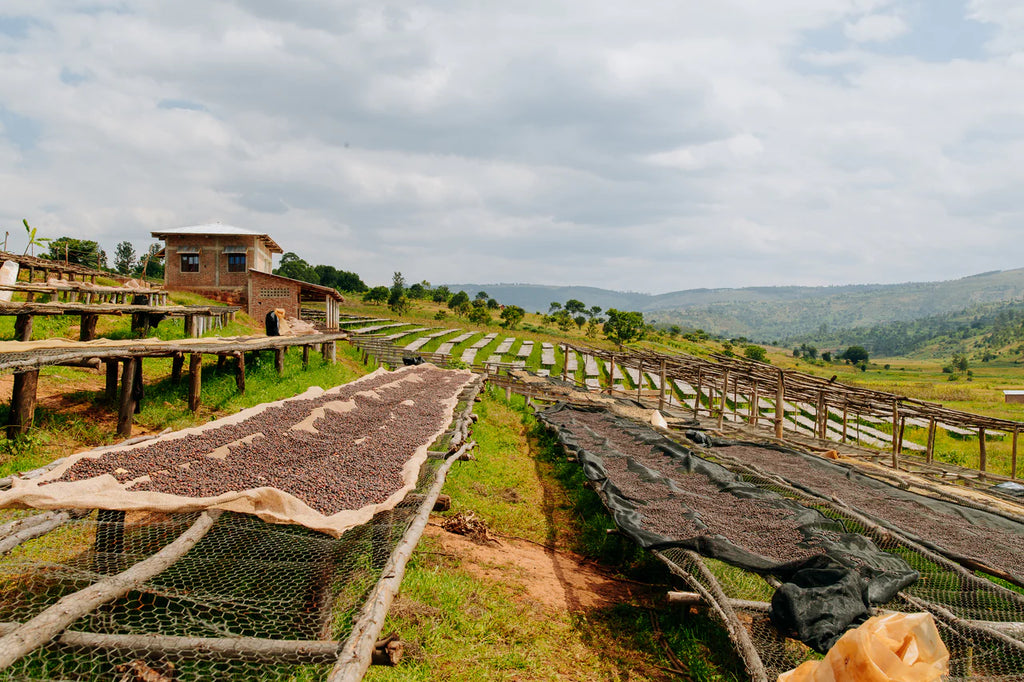New Coffee Release - Burundi Nyagishiru Natural
Region - Muyinga
Altitude – 1500 - 1700 masl
Varietal – Red Bourbon
Process – Natural
CHERRY COLA, PINOT NOIR, DARK CHOCOLATE, ORANGE BLOSSOM, BAKING SPICES.

Nestled in the heart of East Africa, Burundi is an oft-forgotten, small, yet fascinating coffee origin. The history of coffee in Burundi is complex, intertwining with the unrest and turmoil that has rocked the country for nearly a century.
Much like in neighboring Rwanda, the Democratic Republic of the Congo, and Tanzania, coffee cultivation in Burundi began when the Belgians brought Arabica seedlings in the 1930s. The climate is perfect for growing coffee: high altitude, hot temperatures, moist air, and nitrogen-rich soil. At the time, Belgium forced Burundi to grow coffee as a cash crop. The people of Burundi were given few resources to cultivate coffee and very often received little to no compensation for their work.
After gaining independence in 1962, farmers no longer wanted to associate themselves with coffee but had few choices beyond that for economic well-being. Coffee reminded them of the former imperialist structures that had dominated their lives. Farmers who continued to grow coffee often did so without much care and attention, so quality coffee, which does not happen by accident, was not happening. All the while, coffee remained the backbone of the country’s economy, though quality remained poor.
The decades following Burundi’s independence were rife with political and socioeconomic instability and conflict. Between 1972 and 1993, Burundi underwent several regime changes, leading to the displacement or death of hundreds of thousands of people. This led to a civil war beginning in 1993. Rebels during the war encouraged the uprooting and destruction of coffee trees to destabilize the economy, furthering the disdain for coffee production. The civil war ceased in 2005, yet power imbalances and political corruption continue to this day. As a result, Burundi remains one of the poorest countries in the world.
Coffee, however, provides hope and resiliency for change in Burundi. Farmers in Burundi saw how quality coffee provided change for coffee farmers in neighboring Rwanda and began emulating their practices. After the coffee sector was privatized in 2008, they began forming cooperatives, taking ownership of, and building washing stations and dry mills previously owned by the state, all of which helped overcome the hurdles many producers face.
This Natural Red Bourbon comes to us from the Nyagishiru washing station. Surrounded by around 7000 trees, Nyagishiru is in the Buhinyuza Commune of the Muyinga Province of Burundi. Muyinga, which borders both Rwanda and Tanzania, is one of least populated and lesser-known coffee producing regions of Burundi.
Thanks to the relatively flat land here, this station focuses on using the natural process to produce coffee, and they can produce high volumes. Nyagishiru comfortably processes coffee from almost 850 families. Composted coffee pulp is shared with local producers, and seedlings are distributed to farms to increase their yields. On top of that, Matsitsi Trading Company (often called Matrco for short), the owner of the station, has funded a school and health care center for the community. One of only two stations in the area that processes coffee, this station is a vital resource for the region’s coffee farmers and their families.


